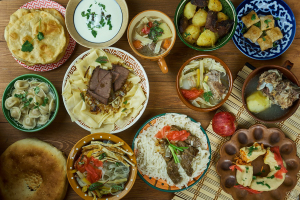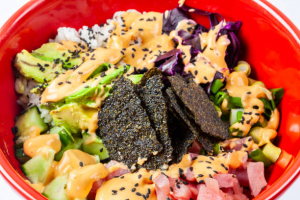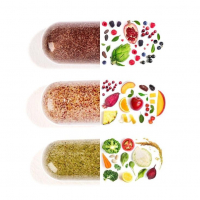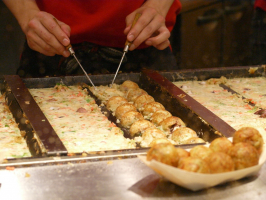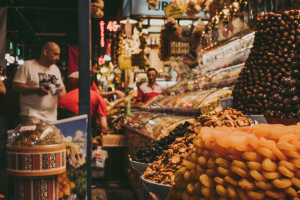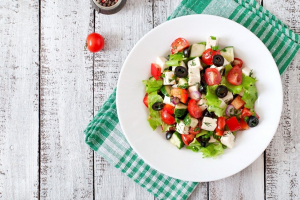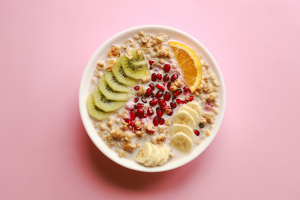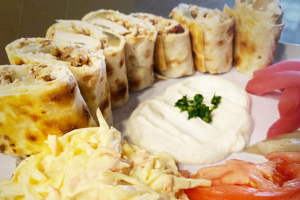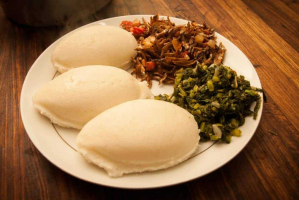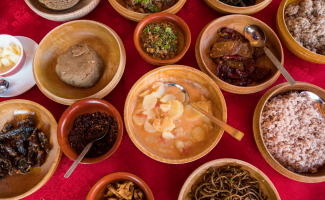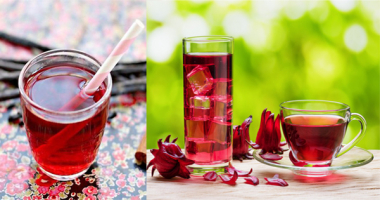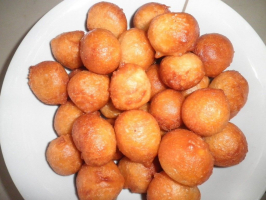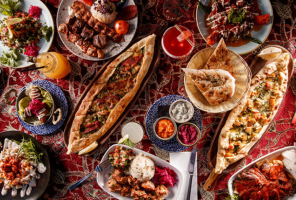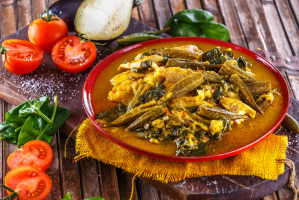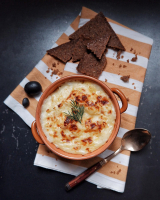Top 10 Best Chilean Foods
Chilean cuisine is best described as a fusion of Spanish influences and indigenous Mapuche culture and ingredients. It is home to a diverse range of ... read more...agricultural products as well as a unique variety of fish and seafood due to its diverse geography and oxygen-rich waters. If you're planning a trip to Chile and want to get a taste of the local cuisine, Toplist hopes our list of the Top 10 greatest Chilean cuisines will point you in the right direction.
-
Niños Envueltos translates as "wrapped children" and can refer to both Chilean steak rolls (shown below) and stuffed cabbage rolls. The former is made with steak wrapped around a vegetable filling, while the latter is made with ground meat and rice wrapped inside cabbage leaves.
Chilean steak rolls are particularly popular with children. Recipes vary by family, but they're usually made with flank steaks stuffed with chard leaves, zucchini, and carrots. The steaks are rolled and toothpick-held together before being browned in a pan and stewed with tomato sauce, mushrooms, and vegetables.
People who are familiar with Balkan cuisine may recognize this version of Niños Envueltos as the Chilean equivalent of sarma. It's a type of wrapped dolma that's popular in many cuisines across the Balkans, Central Europe, the South Caucasus, and the Middle East.
Niños Envueltos are made with blanched cabbage leaves wrapped around a filling of ground beef, rice, garlic, onions, herbs, and spices, similar to sarma. The rolls are shaped into cylinders and baked in tomato sauce.
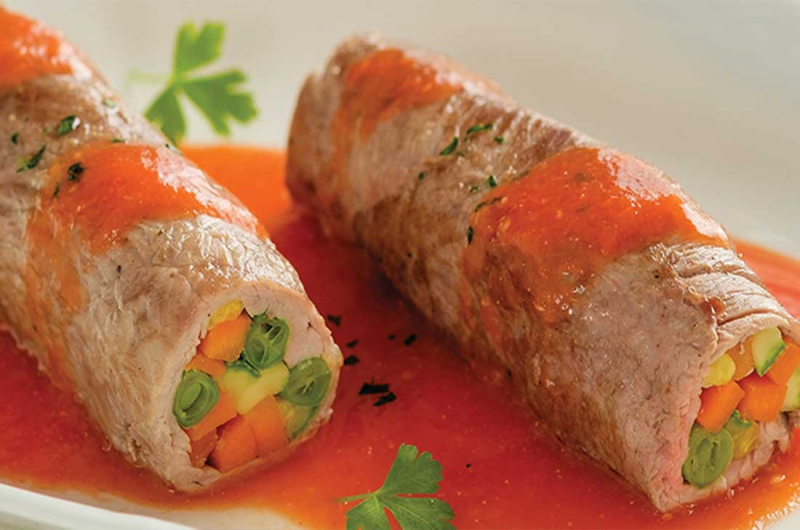
cocinavital.mx 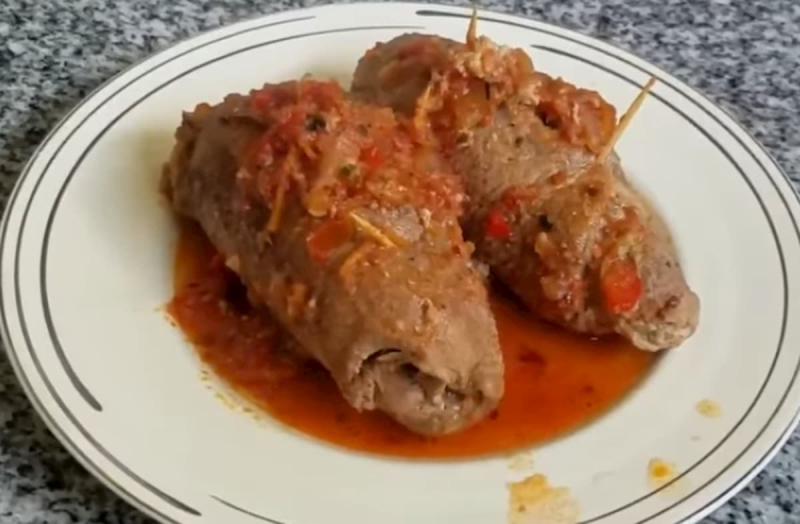
omarfierro.com -
Chochoca (or chochoyeco, trotroyeco, trutru) is a Chilean festival dish that originated in Chile. It's made of a potato-and-flour dough wrapped around a metal cylinder shaped like a large rolling pin. The cylinder, like a roast pig, is slowly rotated for about thirty minutes to roast the dough over hot charcoal.
When the chochoca is cooked, it is sliced into pieces and eaten on its own or with chicharrones. As you might expect, it's not something you'd make at home, but rather something reserved for special occasions like fiestas and food fairs. Depending on the type of dough used, there are two kinds of chochoca: black chochoca and white chochoca.
The more traditional of the two is black chochoca, which is made with grated raw potatoes mixed with ground cooked potatoes, salt, and lard. The white version, which is more popular, is made with equal parts wheat flour and ground cooked potatoes.
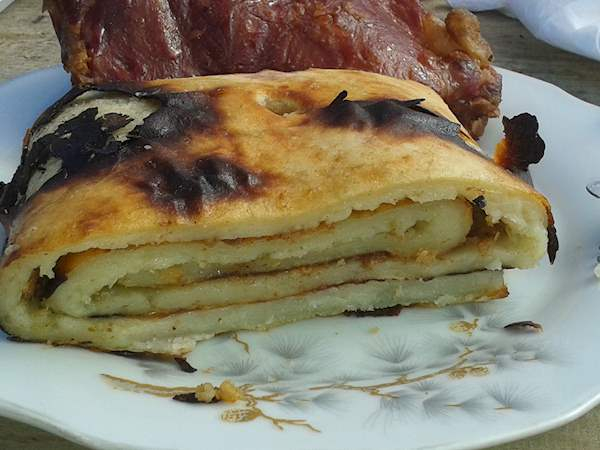
tasteatlas.com 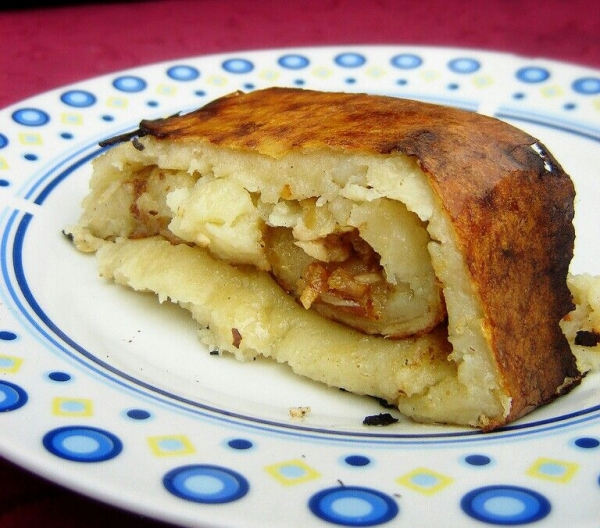
cocina-chilena.com -
After a night of drinking in Santiago, you'll probably want to sink your teeth into a bowl of valdiviano, a traditional Chilean soup from the south of the country. It originated in the city of Valdivia and has since spread throughout the country, where it is frequently promoted as a hangover cure.
Valdiviano recipes in Chile vary, but it is typically made with thin strips of charqui (Chilean beef jerky) or leftover beef cooked in a soup with onions and various herbs and spices such as oregano, parsley, cumin, and paprika. Other ingredients, such as potatoes and eggs, may be added depending on the cook. When made with potatoes, the dish is referred to as ajiaco.
Valdiviano is said to have been invented around the turn of the seventeenth century. Spanish soldiers stationed in Valdivia were given large quantities of charqui from central Chile, which they used to make this soup.
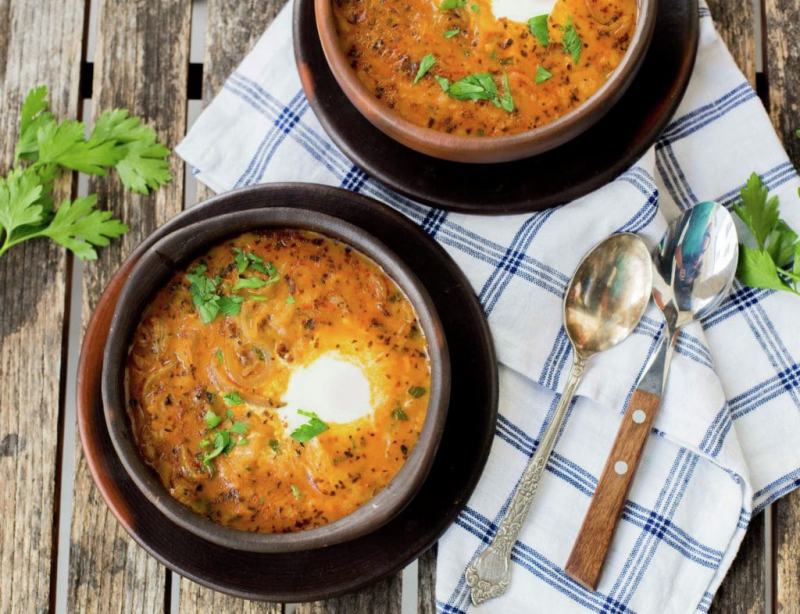
chileanfoodandgarden.com 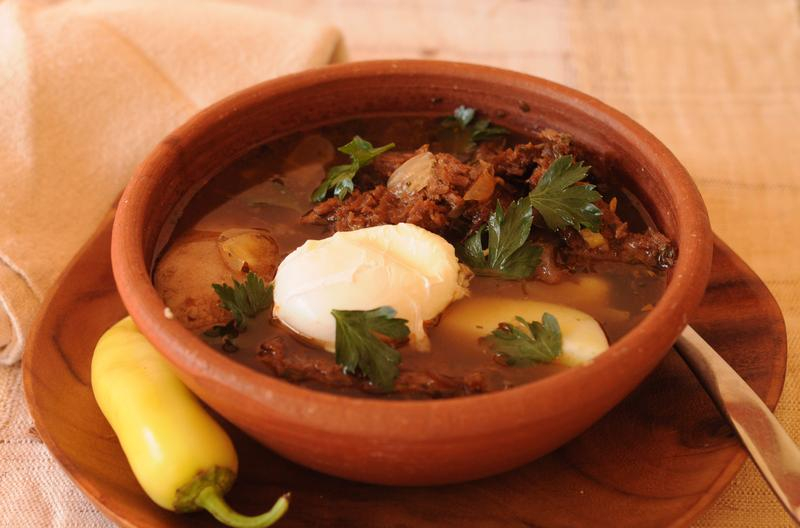
worldfood.guide -
Cazuela refers to both a traditional Chilean dish and the cooking vessel used to prepare it. Cazuela is a term used to describe a family of soups or stews made with various meats and vegetables cooked together in an unglazed earthenware pot called a cazuela (Spanish for "casserole" or "cooking pot").
Chilean cazuela can be made with a variety of proteins, including pork, goat, lamb, turkey, or llama, but the most popular versions use chicken (cazuela de ave) or beef (cazuela de vacuno). It's made by boiling the meat in one pot with chopped onions and carrots, while the rest of the ingredients are boiled separately in separate pots. All of the components come together only when the dish is served.
A bowl of cazuela is typically served with squash, potatoes, corn, and rice to accompany the meat. It is typically topped with fresh parsley, coriander, or aji verde (spicy green sauce). Leftovers from the meal are typically saved and used to make carbonada.
In addition to carbonada, the ingredients in a Chilean cazuela are known to shift with the seasons. Cazuela de ave (pictured below) is typically made with corn, green beans, and peas in the summer, while rice or polenta is often added in the winter.
In the summer, corn, peas, green beans, and tomatoes are commonly used, whereas in the winter, potatoes, carrots, spinach, or chard are commonly used. It's a hearty and filling soup that goes well with crusty bread and pebre salsa, no matter the season.
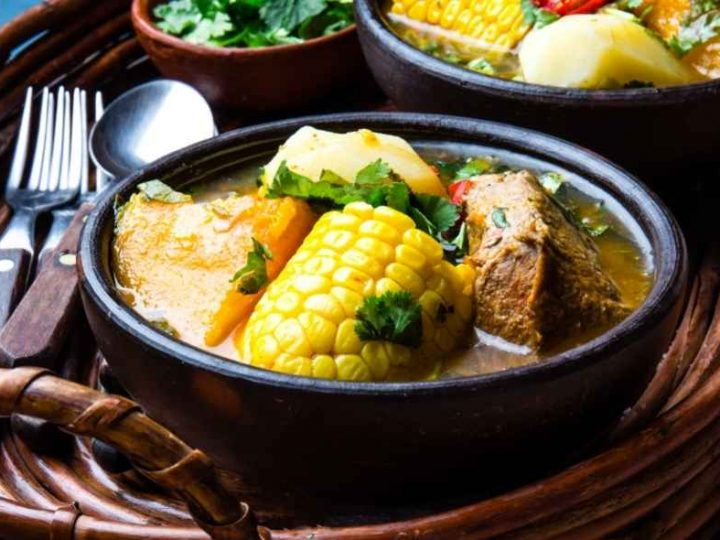
travelfoodatlas.com 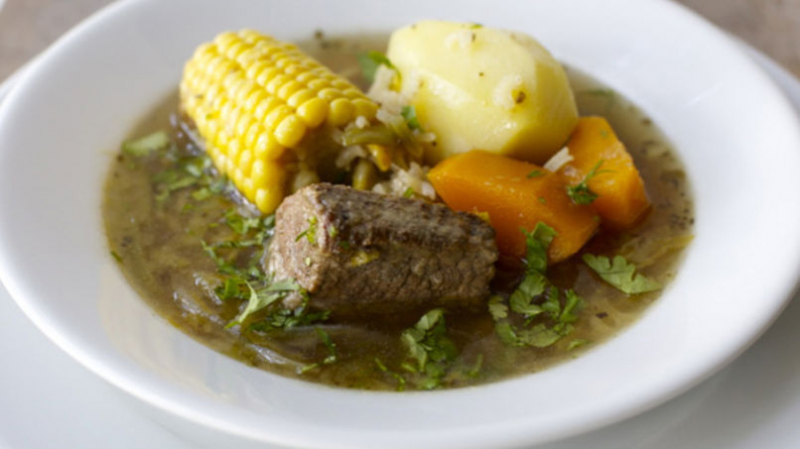
quericavida.com -
Caldillo de congrio literally translates to "conger chowder," and it refers to a popular Chilean fish soup made with conger eel as the main ingredient. It can be made with either congrio dorado (pink cusk eel) or congrio colorado (red cusk eel), both of which are common cusk eel species in the Chilean Sea.
Caldillo de congrio is made by boiling pieces of chopped and cooked eel in a pot of water to make the broth. The broth and eel (and optionally cream) are then combined with sautéed onions, garlic, bell peppers, carrots, and tomatoes. When finished, garnish with parsley, coriander, or scallions and serve with crusty bread and a glass of Chilean wine.
Caldillo de congrio is such a popular part of Chilean cuisine that Nobel laureate Pablo Neruda famously wrote an ode to it called "Oda al Caldillo de Congrio." If you travel to this country, Caldillo de congrio is must-try.
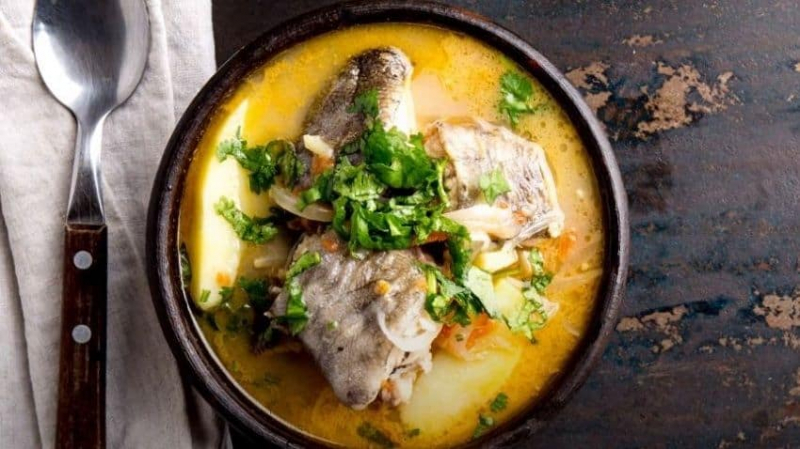
recetasdesopaipillas.com 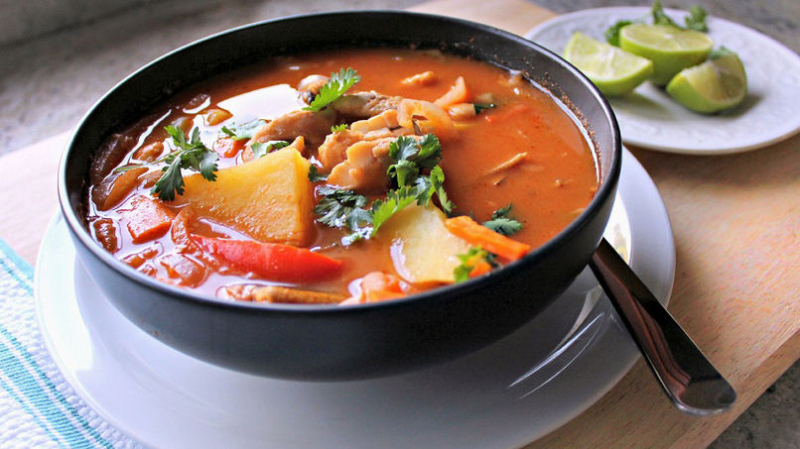
quericavida.com -
The most common type of bread in Chilean cuisine is marraqueta. They're crusty and crunchy like French bread, hence the alternative name pan francés, and they're known for their distinctive shape and large-ish size, which allows them to be easily divided into four segments. It resembles four bread rolls rolled into one.
Marraqueta is a popular Chilean dish that is eaten on a daily basis. They're also known as pan batido (whipped bread) or pan francés (French bread), and they're frequently eaten for breakfast, with pebre salsa or mashed avocado, or as sandwich bread.
According to some historians, marraqueta may have originated in Valparaiso in the late nineteenth and early twentieth centuries. Thousands of European immigrants arrived in this major port city at the time, including two French baker brothers with the surname Teran-Marraquett. They created this bread, which quickly became a staple food in Chile.
Marraqueta is now a staple of Chilean cuisine and culture. Its significance is best exemplified by the popular saying, "Nació con la marraqueta bajo el brazo." Similar to having a "silver spoon in one's mouth," this means "to be born with a marraqueta under one's arm" and describes a child with a secure future.
Apart from Chile, marraqueta is popular in many other South American countries, including Bolivia, Brazil, Peru, Argentina, and Uruguay. It is also available in Portugal, Mallorca, Hong Kong, and Macau.
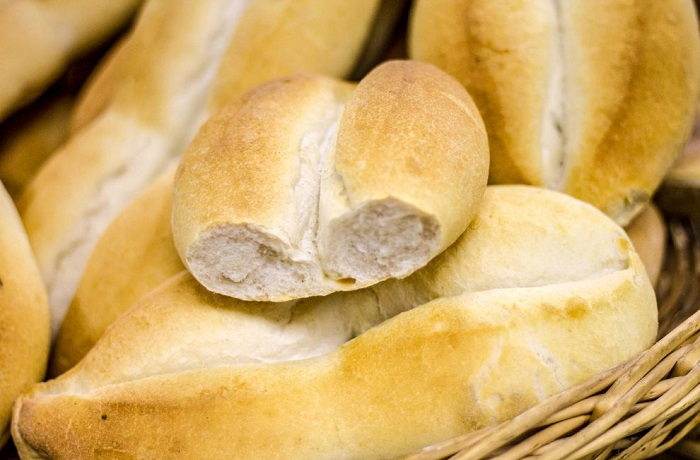
recetasdepan.net 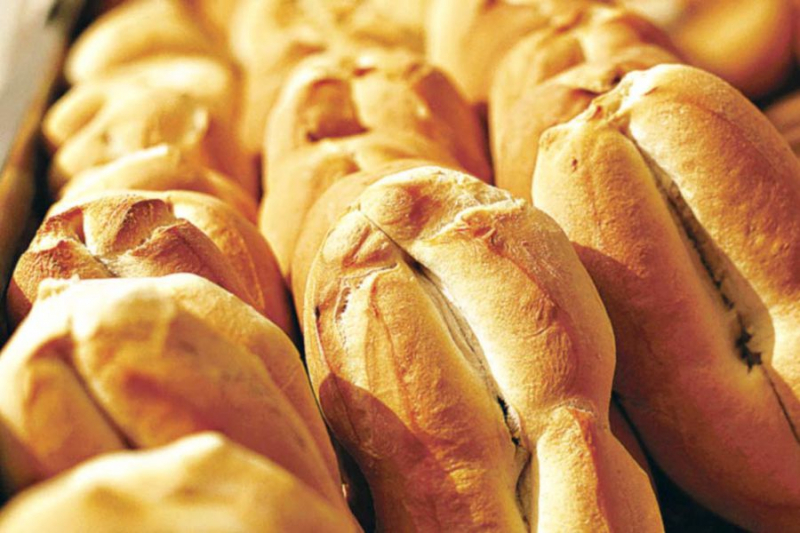
latercera.com -
Many former Spanish colonies, including Argentina, Venezuela, Belize, Costa Rica, Peru, Puerto Rico, and the Philippines, consume empanadas in large quantities. Many consider it to be a national dish in Chile.
If you haven't had one before, an empanada is a baked or fried turnover pastry filled with savory ingredients such as meat, corn, tomatoes, and cheese. Its name derives from the Spanish word empanar, which means "to bread" or "to wrap something in bread."
Empanadas come in a plethora of sizes, shapes, and filling options. They're typically small and eaten as a snack, but in Latin America, some are large enough to be eaten as a main course. Empanadas de pino are among the most popular in Chile. It's a large Chilean empanada stuffed with minced beef, onions, olives, raisins, and hard-boiled eggs.
Though most people associate empanadas with savory sancks, they can also be made with sweet fillings. Empanadas de pera (pear) and empanadas de manzana are two of Chile's most popular sweet empanadas (apple).
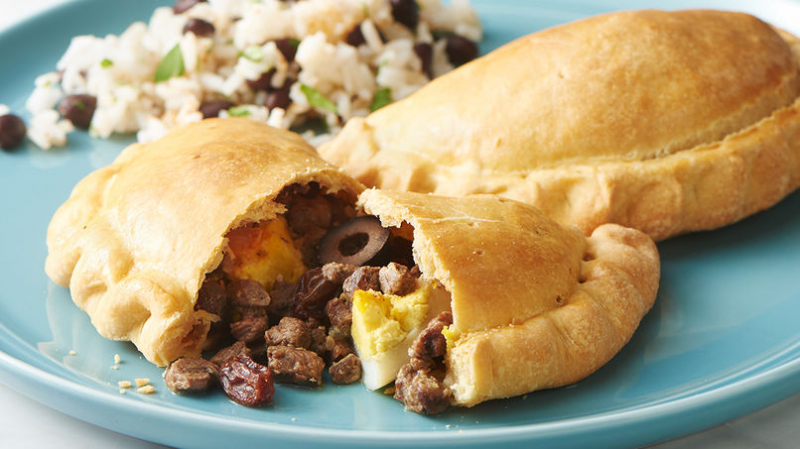
quericavida.com 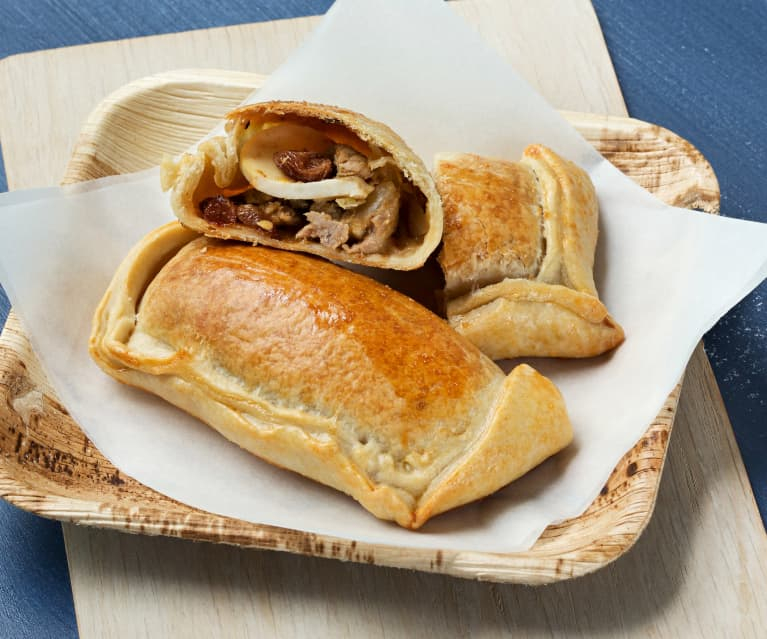
cookidoo.international -
A sopaipilla (also known as a sopapilla, sopaipa, or cachanga) is a type of fried pastry or bread popular in many South American countries, including Chile, Argentina, Peru, and Uruguay. Since the 18th century, they've been a Chilean tradition, often made at home or sold as street food.
The Chilean version of sopaipilla consists of round and flat pieces of leavened wheat dough enriched with vegetable shortening (or butter) and cooked ground pumpkin. Allow the dough to rise before rolling it out and cutting it into circular shapes. They're then deep-fried in oil, where they puff up and form a hollow pocket in the center.
Chilean sopaipillas can be savory or sweet and eaten with a variety of toppings such as pebre salsa, ketchup, mustard, avocado, jam, honey, butter, or cheese. Sopaipillas pasadas, a variation of the dish, can be made by boiling them in chancaca sauce, a type of homemade syrup made with panela (unrefined whole cane sugar), cinnamon, and orange peel.
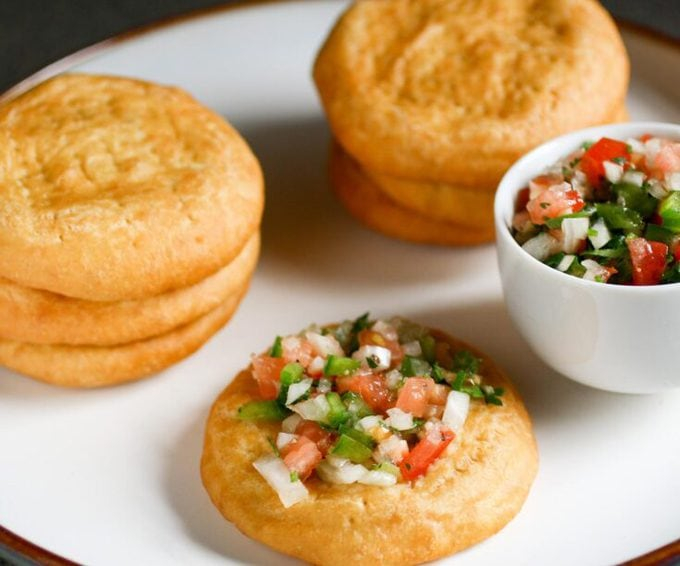
curiouscuisiniere.com 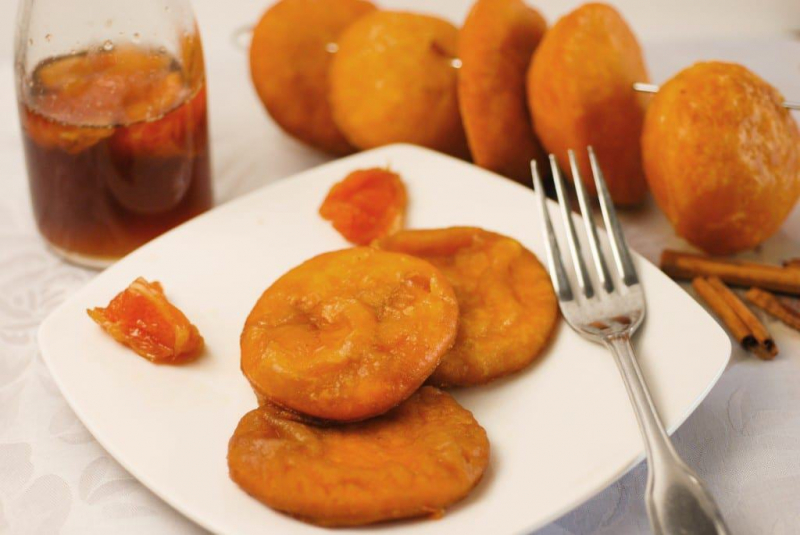
internationalcuisine.com -
Curanto is an ancient food preparation technique that originated in Chile's Chiloé archipelago. Curanto, which means "stony ground," refers to the method of cooking seafood, meat, and potatoes in a pit lined with rocks. To make curanto, a meter-deep (3.3-foot) hole is dug into the ground and lined with stones. To heat the stones, a wood fire is lit. Shellfish, meat, sausages, and potatoes are among the ingredients loaded into the hob.
In Chile, summer is the best time to try traditional curanto. Restaurants will serve curanto en olla, or "curanto in a pot," a stovetop version of this ancient meal, during the wetter winter months.
The ingredients vary, but a proper curanto must include a variety of potatoes cooked in three different ways: whole steamed, dumplings (chapaleles), and pancakes (milcaos).
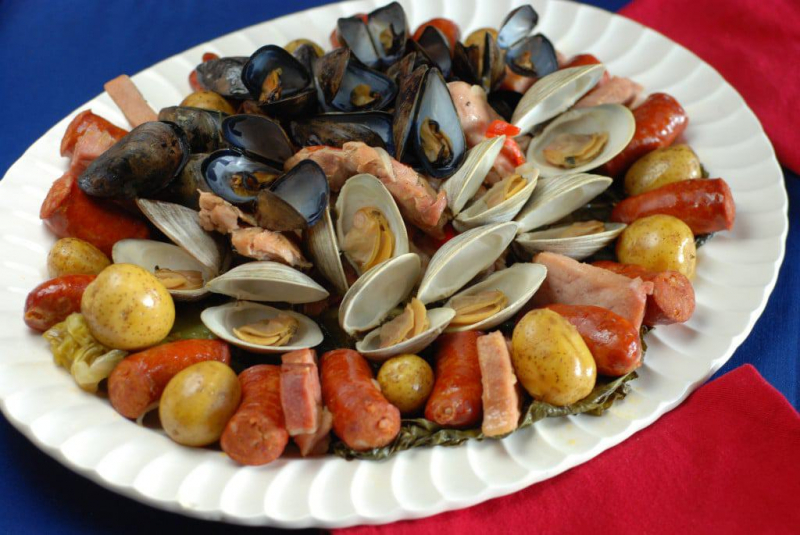
internationalcuisine.com 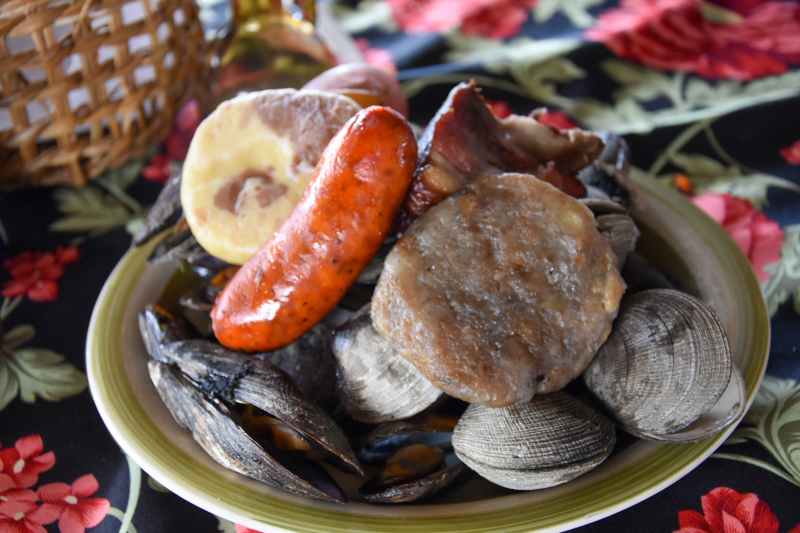
theexpater.com -
If you like American comfort food, you'll love completo, Chile's version of the famous hot dog. It's one of Chile's most popular street foods and comes in dozens of variations, the most popular of which are the italiano, clasico, and dinámico. Eduardo Bahamondes, a Chilean national who had his first taste of an American-style hot dog on a business trip to the United States in the 1920s, introduced the completo to Chile. He wanted to introduce it to the Chileans, so he opened Quick Lunch Bahamondes in Santiago's historic center shortly after returning to Chile.
The traditional completo, also known as the completo clasico, is shown below. It's made with boiled wiener sausage that's served in a soft bread roll with chopped tomatoes, sauerkraut, and a generous helping of mayonnaise. The completo italiano is the most popular type of Chilean hot dog (pictured below). It gets its name, like churrasco Italiano, from the color of its ingredients – mashed avocados for green, mayonnaise for white, and tomatoes for red. In addition to these three toppings, many Chileans will top their completo italiano with ketchup, mustard, or hot sauce.
Aside from the classico and italiano, other popular versions of completo in Chile include:
- Dinámico Completo: Served with chopped tomatoes, sauerkraut, avocado, and a green sauce made of chopped parsley, mayonnaise, and carrot, onion, and pickle relish.
- Gringo Completo: Served with tomatoes, pickles, lettuce, onions, and mayonnaise.
- Complete the Brazilian: melted cheese and avocado on top.
- Completo Falso: Vegetarian version omitted the sausage.
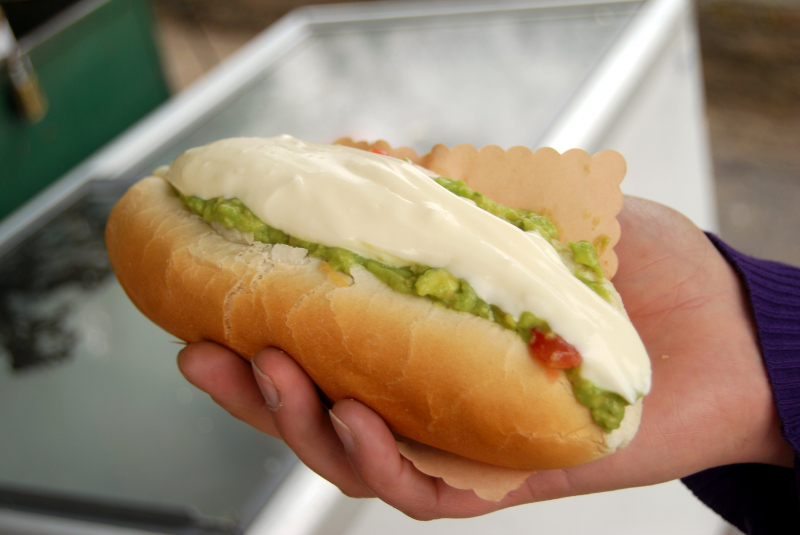
es.wikipedia.org 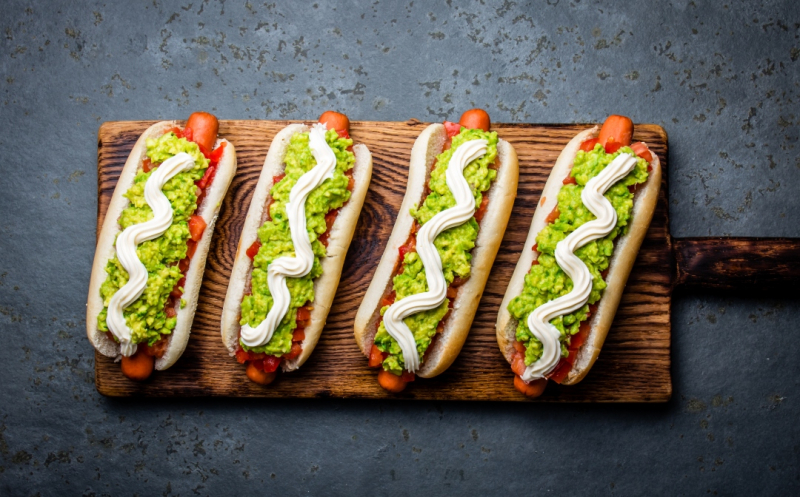
chile.travel













